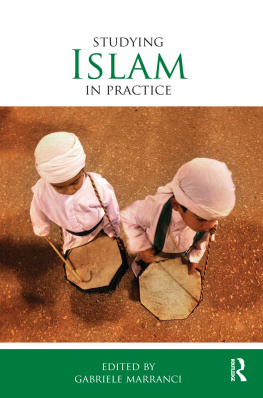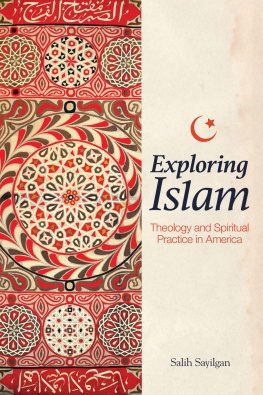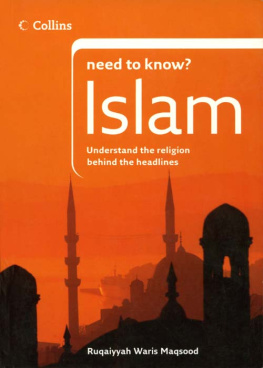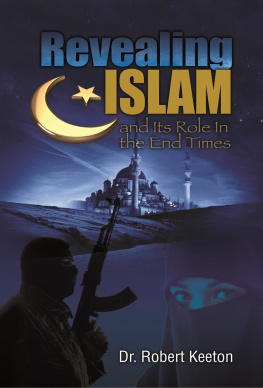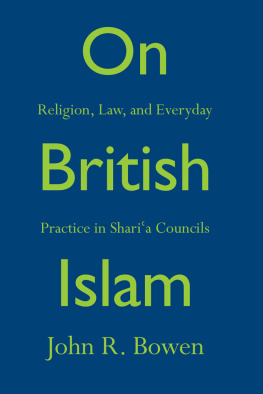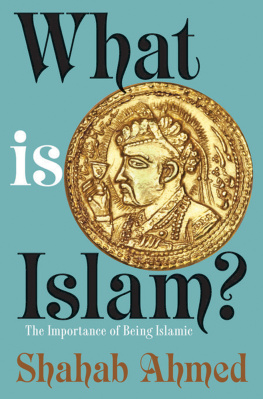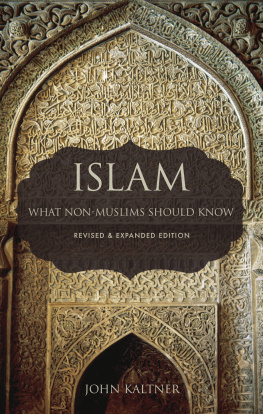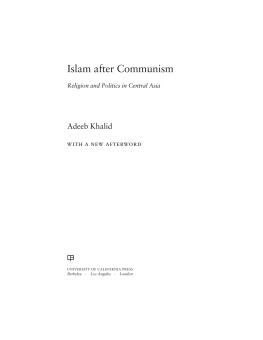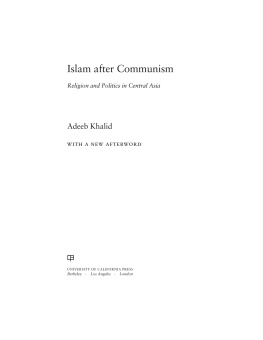
Studying Islam in Practice
This book presents Islam as a lived religion through observation and discussion of how Muslims from a variety of countries, traditions and views practise their religion. It conveys the experiences of researchers from different disciplinary backgrounds and demonstrates the dynamic and heterogeneous world of Islam. The fascinating case studies range from Turkey, Egypt, Morocco and Lebanon to the UK, USA, Australia and Indonesia, and cover topics such as music, art, education, law, gender and sexuality. Together they will help students understand how research into religious practice is carried out, and what issues and challenges arise.
Gabriele Marranci is Director of the Study of Contemporary Muslim Lives research hub based in the Department of Anthropology at Macquarie University, Australia. He is also Honorary Associate Professor at Cardiff Universitys Centre for the Study of Islam in the UK. His books include The Anthropology of Islam (2008) and Faith, Ideology and Fear: Muslim Identities Within and Beyond Prisons (2009).
Also available:
Studying Buddhism in Practice
John S. Harding
Studying Hinduism in Practice
Hillary P. Rodrigues
Studying Islam in Practice
Edited by
Gabriele Marranci

First published in 2014
by Routledge
2 Park Square, Milton Park, Abingdon, Oxon OX14 4RN
and by Routledge
711 Third Avenue, New York, NY 10017
Routledge is an imprint of the Taylor & Francis Group, an informa business
2014 Gabriele Marranci for selection and editorial matter; individual contributors, their contributions.
The right of the editor to be identified as the author of the editorial material, and of the authors for their individual chapters, has been asserted in accordance with sections 77 and 78 of the Copyright, Designs and Patents Act 1988.
All rights reserved. No part of this book may be reprinted or reproduced or utilized in any form or by any electronic, mechanical, or other means, now known or hereafter invented, including photocopying and recording, or in any information storage or retrieval system, without permission in writing from the publishers.
Trademark notice: Product or corporate names may be trademarks or registered trademarks, and are used only for identification and explanation without intent to infringe.
British Library Cataloguing in Publication Data
A catalogue record for this book is available from the British Library
Library of Congress Cataloging-in-Publication Data
Studying Islam in practice / [edited by] Gabriele Marranci.
pages cm. -- (Studying religions in practice)
1. Islam--21st century. 2. Islamic sociology.
3. Islam--Customs and practices. I. Marranci, Gabriele.
BP161.3.S78 2014
297--dc23
2013031220
ISBN: 978-0-415-64397-9 (hbk)
ISBN: 978-0-415-64398-6 (pbk)
ISBN: 978-1-315-85095-5 (ebk)
Typeset in Bembo
by Taylor & Francis Books
Contents
GABRIELE MARRANCI
MARIA F. CURTIS
LAWRENCE ROSEN
L. L. WYNN
DAVID DRENNAN
CAROL L. DELANEY
CHRISTOPHER HOUSTON
BRIDGET BLOMFIELD
PAMELA NILAN
MARZIA BALZANI
DERVLA S. SHANNAHAN
CARIN BERG
MUNIR JIWA
JOHAN FISCHER
LEON MOOSAVI
GARY R. BUNT
MAREIKE J. WINKELMANN
RONALD LUKENS-BULL
General Editor: Hillary P. Rodrigues
The intent of this series is to assemble an assortment of texts that primarily instruct by addressing two aspects of human activity. One aspect is the practice of religion, and the other is how such practice is studied. Although these books may be profitably consulted on their own, they are ideal supplements to a comprehensive introductory textbook on each of the traditions in question. This is because introductory texts are rarely able to attend adequately to the range of activities that are integral features of most religious traditions. However, religious practice is a vast field of study, and each anthology in this series makes no claim to providing a complete picture of either the religion it addresses or its rich assortment of practices. Instead, the objective in this series is to provide the reader with vignettes of religious practices within particular traditions, as viewed through the experiences of scholars engaged in the study of these religions. As such, the series offers readers a window onto both the doings of religion, and the scholarly study of those doings.
As scholars who study religion in its varied dimensions, and as instructors who teach about religion, we routinely scout for resources to enhance our students learning experience. We wish to teach them about various religions, but also to teach them about the scholarly endeavour of studying religion. Introductory textbooks, however comprehensive they might be in providing necessary factual and foundational information, are typically unable to convey the richness of religious life as experienced by practitioners. By necessity, introductory textbooks tend to favour history, intellectual developments, and teachings from written sources of and about the tradition. Even when they address religious practice, the tone in these textbooks is generally distant and explanatory, rather than descriptively engaging and evocative. Additionally, since the authors persona and presence are often excised from the accounts, these books do little to get across to students what scholars who engage in research actually do and experience. This series is designed to address some of these lacunae.
Each book in this series contains an assortment of pieces written specifically for the anthology in question by established scholars in their field. Other series that focus on practice tend to be collections of translations of religious texts about religious practices, or are anthologies of classic articles previously published in scholarly journals. Texts of the former type are actually still slanted to the textual tradition, while those of the latter type do not have novice students as their intended audience. The essays in the volumes of this series are purposely crafted differently from typical articles published in scholarly journals, chapters in edited academic volumes, or papers presented at scholarly conferences. They are even different in style from what one might find in textbooks and ethnographic anthropological literature, although recent writings from the latter category are probably closest in stylistic character. The writings in these collections derive from the memories, notes, photos, videos, and such, of scholars who were in the process of studying, and who still continue to study, some aspect of religious practice.
The sensibilities within, and tone of, these writings are partly derived from postmodern orientations, which indicate that, regardless of whether one is an insider or an outsider, ones understanding of reality is always partial. A pervasive and generally erroneous belief is that insiders to a tradition (i.e. adherents) know the real meaning of what is transpiring when they engage in religious activities. However, even for religious insiders, that is, believers and participants in a religious practice such as a pilgrimage or rite of passage the understanding of the phenomenon they are experiencing is always mediated by their own backgrounds, cultural familiarity, age, experience, degree of interest in their religion, and so on. They do not necessarily know the meaning of what is going on, simply because they are insiders. Each insiders understanding is partial. Nevertheless, one effective way to learn about religious practice would be to read about these activities from the perspective of insiders. But the volumes in this series are not collected writings by religious insiders about their practices, however valuable and interesting such accounts might be. Rather, these are writings by persons engaged in the academic study of religion.
Next page
